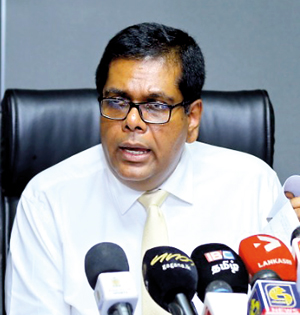Blueprint to amend archaic Sports Law ready but will it see light of day
View(s):
Panduka Keerthinanda
The Sports Ministry has decided to remove some of the intrusive and restrictive clauses from the old Sports Law No 25 of 1973 to give more independence to national sports associations and to resolve conflict with international laws that govern sports bodies.
The blueprint has already been done but whether the new Government will proceed with the initiative started by the previous administration remains to be seen. But the changes are imperative and the only way forward to keep politics out of sports, with proper checks and balances.
In 2013, Sri Lanka agreed to let the International Olympic Committee (IOC) review the Sports Law to make it compatible with the basic principles that govern the Olympic Movement. But little was done to follow through on recommendations. The IOC has repeatedly warned Sri Lanka of repercussions if it fails to introduce changes to minimise political interference, and to safeguard the autonomy and independence of sports associations.
After many years, the Sports Ministry is finally putting the finishing touches to the new amendments. Accordingly, the proposed amendment– the fourth to the Sports Act, following amendments in 1988, 1993 and 2005 – will allow national sports associations to audit their annual accounts through a National Audit Office-appointed private auditor. Sports bodies, especially the National Olympic Committee of Sri Lanka (NOCSL), have repeatedly for exemption from Government audits. The Sports Ministry previously denied this request saying the NOCSL falls within the ambit of the Sports Law and, therefore, requires auditing by Government auditors.
The auditing of accounts by Government auditors is presently a mandatory requirement under the Sports Law for all national sports associations and all committees including the NOCSL, but has often been resisted by the NOCSL. This has caused repeated delays in the holding of annual general meetings owing to the workload of auditors. It has, however, been a useful check-and-balance in governance of these largely corrupt institutions. While these sports bodies receive some funds from their internationally affiliated bodies, their main source is the Ministry of Sports.
“This is a very important amendment we are doing in keeping with the local Act and the international laws,” said Attorney Panduka Keerthinanda who was instrumental in bringing in laws for tackling doping and corruption in sports. “We do not want to remove it completely as it is a vital check-and-balance but we also felt the existing system caused delays given the NAO’s workload. This amendment will allow these associations to get their accounts audited by an independent auditor appointed by the NAO.”
Keerthinanda who was legal adviser to former Sports Minister Harin Fernando added that delays in auditing have led to administrative issues within sports bodies, causing the appointment of interim administrations by the Sports Minister. They have then seen these ‘interim’ administrations continue for years, often invoking the wrath of their respective international federations.
“This was a major issue we had,” Keerthinanda said. “We have seen interim committees continuing for long periods. This is unacceptable and against the international laws. For instance, International Cricket Council and International Olympic Committee and their affiliates strongly reject political interference of any sort.”
Under the proposed changes, while the Minister can still go for interim arrangements in the event of suspension or cancellation of registration, he shall only do so in consultation with the National Sports Council – a 13-member advisory body to the Minister – for a specific time period not exceeding six months. The interim committee will have three or five members only.
Meanwhile, the proposed amendments set out pre-qualifications of members to be appointed into the National Sports Council which advises the Minister of Sports in matters connected with the promotion, development and control of sports in Sri Lanka. They should have a proven excellence of service as opposed to being people of the Minister’s choice. The NSC, though in existence for many years, has done little to help develop sports.
“This is the main body to advise the Minister on matters related sports and it’s paramount that we appoint qualified people who have represented Sri Lanka in their respective sports internationally,” Keerthinanda said.
The proposed amendments also make the decisions of the Sports Appeal Committee final and binding, leaving no room for the Sports Minister to intervene. They propose fines for members of national sports bodies involved in malpractices, failure to implement policies of the Ministry and failure to comply with the Sports Law.


